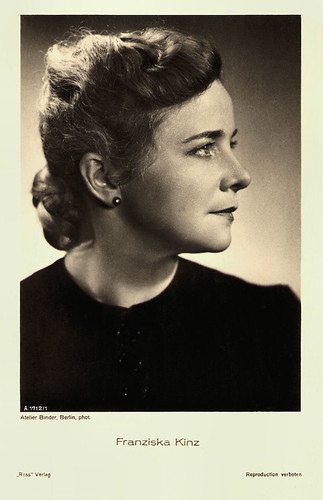
German postcard by Ross Verlag, no. A 1712/1, 1937-1938. Photo: Atelier Binder, Berlin.
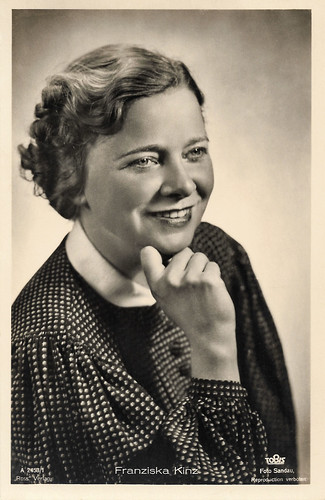
German postcard by Ross Verlag, no. A 2558/1, 1939-1940. Photo: Sandau / Tobis.
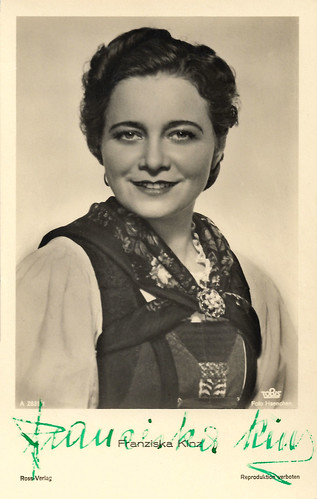
German postcard by Ross Verlag, no. A 2831/1, 1939-1940. Photo: Haenchen / Tobis. Franziska Kinz in Aus erster Ehe/From first marriage (Paul Verhoeven, 1940).
Engaged with an opponent of the NS regime
Franziska Amalia Kinz was born in 1897 in Kufstein, Austria-Hungary (now Austria).
In 1924, she studied with Fritz Basil. After 4 months, he gave her a job at the Staatstheater in Munich. In 1929, Franziska Kinz made her first film, Das Tagebuch einer Verlorenen/Diary of a Lost Girl (G.W. Pabst, 1929), with Louise Brooks.
Her first sound film was the Swedish-German drama Väter und Söhne/Father and Son (Victor Sjöström, 1930) with Rudolf Rittner and Martin Herzberg. A separate Swedish-language film was released the following year.
In 1930, she played on stage in Darmstadt, and in 1933, at the Kammerspielen in Berlin and the Deutschen Theater in Berlin. Later followed engagements in Vienna and Munich.
Kinz was engaged with the politician and opponent of the NS regime Carlo Mierendorff. When he was put into a concentration camp in 1933 and later into prison, their ways were separated. Franziska married a regime loyal journalist. Still, Kinz spoke up for Mierendorff's release which became a fact in 1938. Carlo Mierendorff died in a bunker during an air raid in 1943.

German postcard by Ross Verlag, no. A 2599/1, 1939-1940. Photo: Haenchen / Tobis. Franziska Kinz in Aus erster Ehe/From first marriage (Paul Verhoeven, 1940).
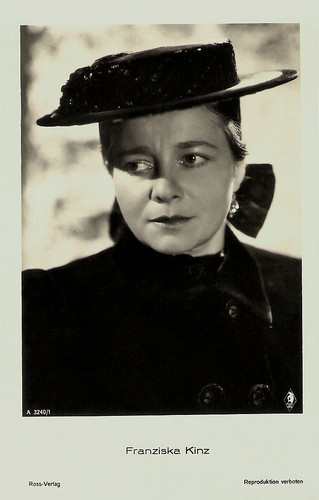
German postcard by Ross Verlag, no. A 3240/1, 1941-1944. Photo: Bavaria Filmkunst.
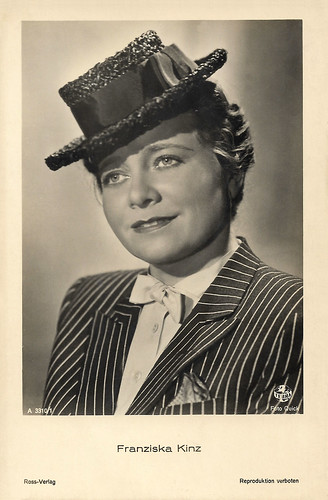
German postcard by Ross Verlag, no. A 3310/1, 1941-1944. Photo: Quick / Terra.
A scene-by-scene English language remake
Franziska Kinz played a supporting part in the drama Rasputin, Dämon der Frauen/Rasputin, Demon with Women (Adolf Trotz, 1932) starring Conrad Veidt. It portrays the influence wielded by Grigori Rasputin over the Russian Royal Family around the time of the First World War.
Another supporting part followed in the Swiss-German war film Tannenberg (Heinz Paul, 1932) starring Hans Stüwe and Käthe Haack. The film is based on the 1914 Battle of Tannenberg during the First World War. It cost over half a million Reichsmark to make and employed 8,000 people.
Another supporting part followed in the drama Mazurka (Willi Forst, 1935) starring Pola Negri as a woman, who is put on trial for murdering a predatory musician. It was partly shot on location in Warsaw. The film was made by Cine-Allianz whose Jewish owners Arnold Pressburger and Gregor Rabinovitch were dispossessed during the pre-production of the film.
Warner Brothers Studios acquired the U.S. distribution rights of the successful film but shelved the film in favour of its own scene-by-scene English language remake, Confession (Joe May, 1937), which starred Kay Francis.
During the Second World War, Kinz starred in Die Kellnerin Anna/The Waitress Anna (Peter Paul Brauer, 1941) with Elfriede Datzig as her daughter. She also appeared in the drama Nora (Harald Braun, 1944), starring Luise Ullrich, and an adaptation of Henrik Ibsen's play 'A Doll's House'.
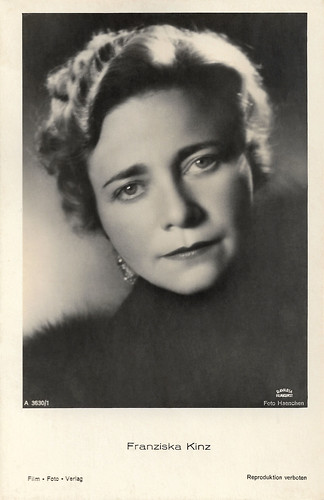
German postcard by Film-Foto-Verlag, no. A 3630/1, 1941-1944. Photo: Haenchen / Bavaria Filmkunst.
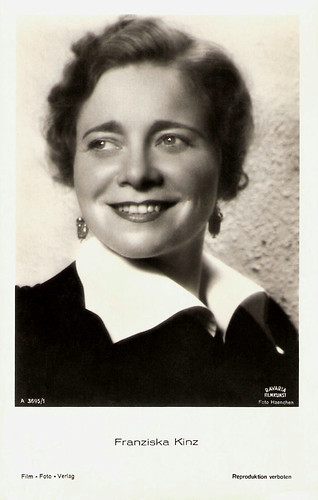
German postcard by Film-Foto-Verlag, no. A 3695/1, 1941-1944. Photo: Haenchen / Bavaria Filmkunst.
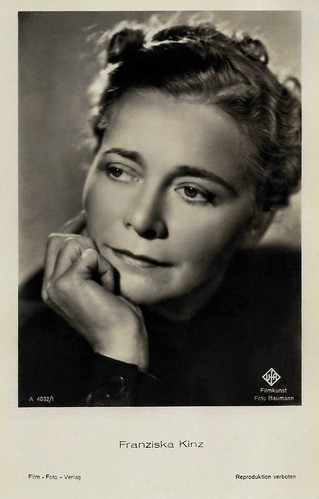
German postcard by Film-Foto-Verlag, no. A 4032/1, 1941-1944. Photo: Baumann / Ufa Filmkunst.
A cow called Daisy
Franziska Kinz was able to continue her career successfully after the war and experienced especially in the 1950s a very busy decade.
She had the female lead in the Heimat film Der Geigenmacher von Mittenwald/The Violin Maker of Mittenwald (Rudolf Schündler, 1950) opposite Willy Rösner and Paul Richter.
She also appeared in the French-Italian box office hit La Vache et le Prisonnier/The Cow and I (Henri Verneuil, 1959, starring Fernandel. It tells the story of a French prisoner of war in World War II forced to work on a farm in Germany who decides to escape by walking away with a cow he calls Marguerite (Daisy in English).
Her last screen appearance was in the TV drama Der Strohhalm/The Straw (Gerhard Klingenberg, 1964), based on a play by Eugene O'Neill. She also worked for the radio.
Franziska Kinz passed away in 1980 in Meran, Italy. She was 83.
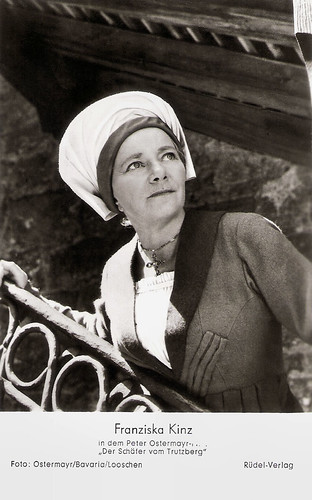
German card by Rüdel Verlag. Photo: Ostermayr / Bavaria / Looschen. Franziska Kinz in Der Schäfer vom Trutzberg/The shepherd from Trutzberg (Eduard von Borsody, 1959).
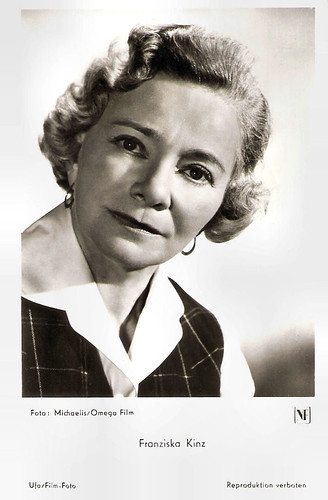
German postcard by Ufa/Film-Foto. Photo: Michaelis / Omega Film / NF. Franziska Kinz in Beichtgeheimnis/Confessional secret (Viktor Tourjansky, 1956).
Sources: Rudi Polt (IMDb), Wikipedia (English and German), and IMDb.
This post was last updated on 28 February 2022.
No comments:
Post a Comment